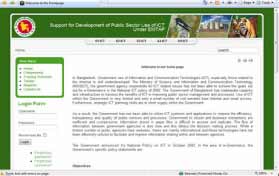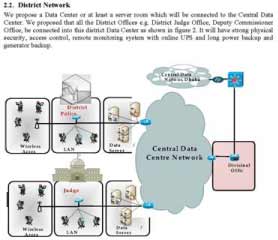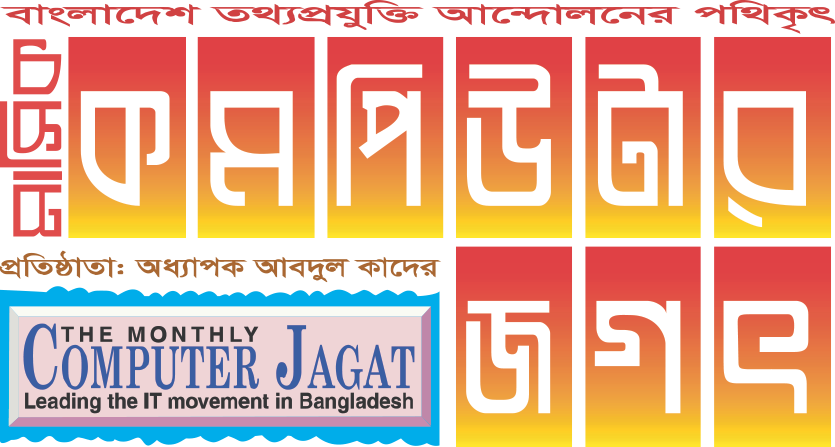হোম > Review on the EMTAP Activities
লেখক পরিচিতি
লেখকের নাম:
আহমেদ হাফিজ খান
মোট লেখা:১৫
লেখা সম্পর্কিত
পাবলিশ:
২০০৮ - সেপ্টেম্বর
তথ্যসূত্র:
কমপিউটার জগৎ
লেখার ধরণ:
আইসিটি
তথ্যসূত্র:
ইংরেজি সেকশন
ভাষা:
ইংরেজি
স্বত্ত্ব:
কমপিউটার জগৎ
Review on the EMTAP Activities
Bangladesh government has undertaken a World Bank financed project Support for Development of Public Sector use of ICT under The Economic Management Technical Assistance Program (EMTAP). The project implementing authority is Bangladesh Computer Council under Ministry of Science and Information & Communication Technology. The project activities are explained in its website www.emtap-ict.gov.bd. One look at the site will show that all is not well with this project. The web site gives the feeling that the project has broken its link with its implementing authority Bangladesh Computer Council and has declared independence.

The web site strongly highlights the failures of the government with strong words like Internet is still underdeveloped, The Government of Bangladesh has inadequate capacity and infrastructure to harness the benefits of ICT in improving public sector management and processes, Government to citizen and business interactions are inefficient and cumbersome, The Ministry of Science and Information and Communication Technology (MoSICT), the government agency responsible for ICT related issues has not been able to achieve the goals set out for e-Governance in the National ICT policy of 2002 etc. The four components of the project are:
Development of National e-Government Strategy for Bangladesh :
PricewaterhouseCoopers, India and IIFC, Bangladesh has been engaged by the project to develop the National e-Government Strategy for Bangladesh at a cost of BDT 146 lacs. The consultants have presented some data and figures from existing surveys and reports and have failed to propose Vision, Goal, Objective, Strategies to achieve set goals etc. The report is not worth the value spent on it. The project authorities are keener on overseas trip than pursuing on the quality of the strategy paper.

Development of National ICT Roadmap/Action Plan for Bangladesh :
Gov3 Limiteda UK based firm has been engaged at a cost of BDT 249 lacs. The output of the firm cannot be called roadmap or action plan. The detailed analysis of the report was published in August 2008 issue of Computer Jagat.
Development of Technical Specification for Government wide ICT Network and Inputs :
Glocoms Inc. USA was awarded the contract at BDT 66 lacs and this will result in procurement and installation of network of BDT 2010 lacs.. The company hired a photographer turned ICT entrepreneur to design the national Government wide network. The quality of such network is questionable.
The proposed network design does not have any implementable network design, ip layouts, network segmentation policy, datacenter design, security policy etc. The most important aspect of the design connectivity between the district, division and Dhaka has been ignored. The only comment that comes to mind at this so called report is – any final year CSE graduate from a local university would have given a better design proposal than Glocoms.
Development of ICT Training Government Officials and Promotion of ICT use for Bangladesh :
The contract was awarded to Open University Malaysia at a cost of BDT 199 lacs. The consultant has submitted a 30 page Training Plan Report. This report is presentation of some figures as data and concluding to a training program on Microsoft Word, Excel, PowerPoint, Outlook Express etc. for the government officials. There is no mention of the methodology of the research, sample size selection and the recommendation of the training plan. The whole training is a modality of making money by overseas trip.
The web site of EMTAP in one of the bashing of the Ministry of Science & ICT in general and the government in particular speaks – The Ministry of Science and Information and Communication Technology (MoSICT), the government agency responsible for ICT related issues has not been able to achieve the goals set out for e-Governance in the National ICT policy of 2002. The failure on the part of the government is due to the greed of overseas trip by the government officials in MoSICT.
The developments of proper strategies, roadmap, infrastructure, human capacity are all essential for the development ICT in the country. The development of these essential components requires a knowledge group comprising of local experts to design, implement and monitor the rollout of these components. The overseas experts can enhance the knowledge base of the local group. Unfortunately for Bangladesh the local knowledge groups could never take shape due to the greed of few corrupts. Bangladesh has ICT experts like Dr. Jaffar Iqbal, Dr. Kaykobad, Dr. Saidur Rahman, Dr. Lutfur Rahman, Dr. Hasan Babu and many others in the industry and government but they have been ignored by the EMTAP project. It is worth noting that academia, industry and government have worked together to draft a revised national ICT Policy voluntarily and without any overseas trip of-course.
The government, industry and the academia must unite to stop the misuse of the scarce resources and formulation of policies and roadmaps which may turn out to be a hindering factor rather than a promotional tool. Emerging information and communication technologies possess enormous potential to improve peoples lives. The government must realize this potential by accelerating the use of these technologies to address critical public needs, particularly in the areas of service delivery, education, health and national security etc. A mechanism must be developed for an approach that draws together multi-sectoral groups of leaders and innovators from technology, government, public interest organizations and business in order to create strategic, sustainable solutions. It has been found that the most effective way to leverage our resources is to structure and operate our own projects in cooperation with our partners and managed by domain specialist instead of working as a traditional overseas grant taking organization or project tied to the whims of the donors and project managers. The time has come to bring the divided ICT under one authority by merging Bangladesh Computer Council and Bangladesh Telecom Regulatory Authority under a competent Ministry of ICT.
CJ Web
লেখাটি পিডিএফ ফর্মেটে ডাউনলোড করুন
পাঠকের মন্তব্য


